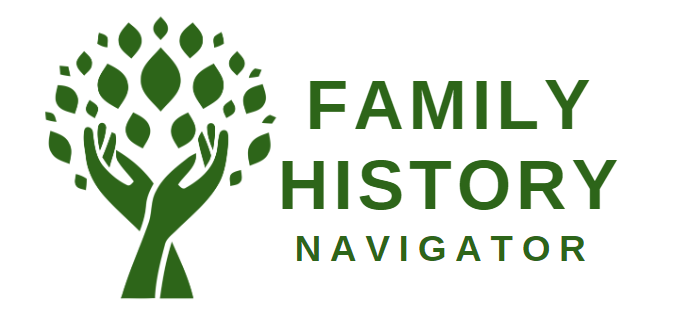Genealogy is more than just a hobby —- it’s a deeply personal journey that connects us with our past and helps us understand who we are. Many people start researching their family history on their own, while others choose to hire a professional genealogist to do the research for them. Finally, some choose a hybrid approach: mostly doing their own research but working with a professional to solve more complicated genealogy mysteries.
As a professional genealogist, I’ve worked with clients at every stage of their family history research. I teach genealogy classes and offer genealogy coaching for those who enjoy conducting their own research. I also offer done-for-you research for those who prefer to outsource this task.
If you’re wondering whether to dive in on your own or seek professional help, this post outlines the pros and cons of all three options.

The Case for Doing Your Own Genealogy Research
First I’ll start off with the pros of doing your own genealogy research:
Personal Satisfaction and Discovery
Doing your own genealogy research enables you to experience the thrill of discovery firsthand. There’s nothing quite like finding an ancestor’s name in an old census record or uncovering a family story hidden for generations. For many, genealogy become a lifelong hobby.
Flexibility and Control
Researching on your own schedule means you can follow leads that interest you most. You decide how much time and money to invest, and you can explore at your own pace.
Cost-Effective
One of the most significant advantages of DIY genealogy is cost savings. While there are expenses like subscriptions to genealogy websites and DNA testing, these are often less than the fees for professional research.
Skill Development
Learning to research builds valuable skills, from analyzing historical documents to interpreting DNA test results. These skills can enrich your understanding of history and become a lifelong passion.
Although there are many positive aspects to conducting your own genealogy research there are also a few challenges. These include:
Steep Learning Curve
Genealogy requires understanding historical records, local history, and sometimes even foreign languages. Beginners may feel overwhelmed by the complexity.
Time-Consuming
Researching family history can take countless hours. It often involves trial and error, especially when records are incomplete or ancestors have common names.
Risk of Errors
Misinterpreting records or attaching the wrong person to your family tree is a common pitfall. These mistakes can lead you down the wrong path, wasting valuable time. If you make a mistake, every earlier ancestor on that part of your tree will also be wrong. I’ve had quite a few students and clients discover one mistake led to hundreds of wrong ancestors in their tree.
Limited Access to Resources
If you only use certain resources for your research (such as Ancestry or FamilySearch, for example), you might miss out on valuable information. In other cases, the answer to your genealogy mystery might be in a local archive nowhere near where you live.
Example: Barbara is a tech-savvy, recently retired librarian whose goal is to dedicate herself to researching her American and Scottish ancestors during her retirement. She took several of my classes to master the basics of genealogy research and DNA analysis. She also dedicates time to reading the latest genealogy books as well as relevant blogs (like this one!).
When to Hire a Professional Genealogist
Professional genealogists are experts trained in genealogy research methods, DNA analysis (genetic genealogy), family history storytelling and more. They can help you break through brick walls, access hard-to-find records, and provide verified well-documented results. Professionals adhere to the Genealogical Proof Standard (GPS) to ensure accuracy.
There are many benefits to hiring a professional genealogist. These include:
Expertise and Training
Professional genealogists understand how to navigate databases and archives, evaluate sources, and analyze complex evidence. Many also have specialized knowledge, such as proficiency in specific geographic areas, ethnic groups, or DNA analysis. For example,
Access to Exclusive Resources
Professionals often have access to subscription databases, archival collections, and networks that aren’t available to the general public.
Save Time and Avoid Frustration
Outsourcing your research allows you to focus on other priorities while a professional tackles the challenges. They know how to navigate obstacles efficiently.
Accurate and Reliable Results
Professionals adhere to rigorous standards to ensure their findings are well-documented and credible. This is especially important if you’re using the research for legal purposes, like inheritance cases or citizenship applications.
Of course, there are also some drawback to consider, including the following:
Cost
Hiring a genealogist can be expensive, especially for long-term projects. Fees typically range from $50 to $150 per hour, depending on expertise and location.
Less Personal Involvement
Some people miss the personal connection to their research when they delegate it entirely to a professional.
Example: Jeff is a busy entrepreneur who is interested in learning more about his heritage and sharing this information with his sons. With his packed schedule, Jeff has neither the time nor the inclination to master the complexities of genealogical research so he hired me to do the research for him. I traced his ancestors back numerous generations to England and Ireland and also created an heirloom family history book he can share with his sons and other relatives.

Finding Middle Ground: Hiring a Genealogy Coach
If you want to learn how to research but need guidance, hiring a genealogy coach is a fantastic option. As a genealogy coach, I empower clients to build their skills while providing professional support. For many people, the ideal solution lies in combining approaches. You might start with your own research, then consult a coach for guidance or hire a professional for specific tasks like translating records or interpreting DNA matches.
Genealogy coaching can offer the following:
Skill Development
A coach helps you understand research methods, source evaluation, and record interpretation. You gain the confidence to tackle challenges independently.
Customized Guidance
Coaches work with you on specific goals, whether breaking through a brick wall, analyzing DNA results, or creating a research plan.
Time and Cost Efficiency
Coaching is often more affordable than outsourcing an entire project. You benefit from professional expertise while doing much of the work yourself.
Ongoing Support
Regular coaching sessions keep you accountable and provide a sounding board for questions and ideas.
Genealogy Research: How to Decide What’s Right for You
What’s right for you is a personal choice. And one that could change over time as your available time, budget, and research goals change. If you’re still undecided, ask yourself these questions:
- Does the idea of mastering genealogy research skills and keeping up with new developments in genealogy excite you?
- Do you lack the time or skills to manage a large research project yourself?
- How much time and money can you invest in your research?
- Do you have access to key tools like genealogy databases and archives and know how to use them effectively?
- Are you stuck on a problem that requires professional help?
Your Genealogy Journey: Next Steps
I hope this article provided you with some things to think about as you decide how to best approach your genealogy journey. There is no right or wrong solution, just the one that is best for you. If you have any questions, feel free to contact me!


Thanks for this detailed overview. I had never thought of genealogy coaching but this is exactly what I need!